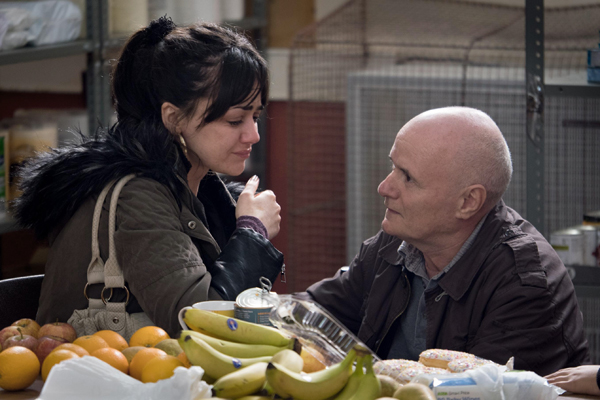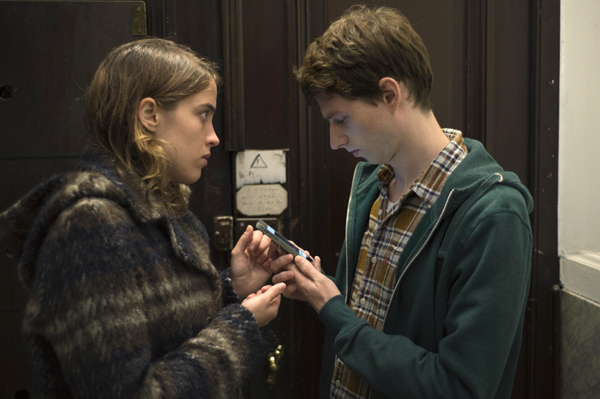Urgency. That was the main ingredient propelling many of the best films at this years Cannes Film Festivalor what many of them woefully lacked.
The winner of the Palme dOr, I, Daniel Blake, was hardly groundbreaking in its execution or subject matter. Defiantly old school, its plot undoubtedly bore the earmarks of the collaboration between British director Ken Loach and longtime screenwriter Paul Laverty. Yet, it had heart and was undeniably moving, leaving the audience teary-eyed. Conversely, The Unknown Girl, by the previous Cannes prize-winning team of Jean-Pierre and Luc Dardenne, felt rote.
In Blake, a dramatic spark is lit immediately during its stark white-on-black opening credits, in which the audience overhears an interview between 59-year-old Daniel Blake (stand-up comedian and jack-of-all-trades Dave Johns) and an unemployment benefits coordinator that goes way off the rails. Blake is too impatient to answer her litany of questions, none of which have anything to do with his health issue.
The exchange begins politely but escalates to exasperation for both parties. It also sets a tone that stays strident and on-course as Daniel faces a labyrinth of bureaucracy as he seeks to appeal the denial of his disability benefits. A carpenter living in Newcastle upon Tyne, he recently had a heart attack at his construction job, and his doctor has pronounced him unable to work. However, he faces a system in which technicalities determine ones fate. Some forms can only be filled online, for example. The problem here: Daniel doesnt have a computer.
An atypical relationship sets this man vs. the system drama apart and keeps it from becoming an election-year critique of Conservative social policies: the comradeship between Daniel, a widower with no children, and a young single-mother of two elementary-age children who has been priced out of London, Katie (the very good Hayley Squires). New to the city, she is minutes late to her appointment at the social services office, where she first meets Daniel. As a result, her benefits are in limbo. Daniel does odd jobs around her dilapidated apartment, asking nothing in return but accepting a place at the dinner table. Katie, on the other hand, goes without food, not out of choice but because there isnt enough in the cupboard.
At times, the pro-proletariat plot takes a turn toward the predictable and melodramatic, especially when Katie finds the only job she can within the world’s oldest profession. Yet in Daniel, the script succeeds in creating a lead character of warmth and tics. Hes the neighborhood fusspot with a social conscience; you want him on your side when neighbors refuse to curb their dogs. Yet he can be his own worst enemy by not playing by the governments rulebook. Luckily, the script gingerly refrains from turning into a rant, as not all of the government functionaries are dead-eyed and heartless (though most of those on-screen are).
In The Unknown Girl, rising star Adèle Haenel (Love at First Fight and In the Name of My Daughter) appears in a bona fide leading role as a headstrong, methodical general practitioner turned amateur detective turned father confessor, Jenny Davin. However, this physician lives by the rule that a good doctor has to control his emotions. Expect tensions to remain on low. Indeed, Haenel gives a cerebral, cool performance, and her character sets the tone.
Jennys about to leave a working-class clinic in the Belgium city of Liège (the directors hometown) for a job at a prestigious medical center. Staying late to train a timid intern after the clinic has closed, she’s showing him the ropes when theres a buzz at the front door. She ignores it. If the caller were a patient and it was a real emergency, as she lectures, err, explains to the greenhorn colleague, the after-hours visitor would buzz again. As if to prove her point, the buzzer rings just once. However, the next day, a police inspector comes by her office to ask her a few questions: the nighttime caller, who was videotaped on the clinic’s security camera, was found dead with a fractured skull by the riverside. The police have found no ID.
Nothing is left unturned as the plot plods along, with Jenny stating the obvious, that shes haunted by the dead woman, who turns out to be a young immigrant from Gabon, and that she blames herself for not opening the front door. However, despite the directors signature style of long takes and seemingly prosaic and indirect dialogue, very little here feels organic, but is readily foreseeable. The pieces fall into place too neatly.
Although the city has a substantial population of nearly 200,000, Jenny somehow knows which of her patients owns what van, and she finds the exact Internet café that fronts as a prostitution ring, which leads her to the dead woman’s identity. Although she may face rough trade and venture out of her milieu of examination rooms, her moral certainly stays solid. The only characteristic about Jenny that might strike viewers as odd or eccentric is that for a highly praised physician, she smokes.
For a drama that strives for a sense of contemporary reality, the artifice of the plot overturns the directors efforts. As Jenny’s intuition brings her closer to who might have been responsible for the young woman’s death, the film comes off as less than credible; some of the actors reactions lack spontaneity, and the choreography of them is too obvious. At one point, the doctor encounters an angry teenager (again, one of her patients) who violently pushes her away. A bit incredibly, the actress falls backward, more than 10 feet into a man-made pitand manages to land feetfirst. Its one of the many giveaways that, hey, this really is a movie and not real life.
Along with Blake, another narrative in the competition lineup with a pungent dose of social realism combined with steadily-building tension was Filipino director Brillante Mendozas immersion into urban squalor, Ma Rosa. It was also filmed in long takes in the ubiquitous hand-held style of street-level filming, but the direction never slackens, and the circumstances remain vital throughout. At times, the actors move about with such determination and alacrity that the pixels of the digital camera can barely keep up. The cast, meanwhile, helps charge up what is otherwise a spare tale of small-time crime and police misdemeanors.
Matriarch Rosa Reyes leads a hard-knock, penny-pinching life: She can’t find a taxi in a rain storm, customers of her convenience store owe her money, and before the day is over, her business and home are raided and trashed by the police. Her layabout husband, Nestor (Julio Diaz), has been dealing drugs, and the pair are taken to the police station’s back room, where the police shake them down for a payoff in the form of bail and the names of other dealers. Because the couple doesn’t have the exorbitant off-the-book settlement, it’s up to their grown children to scrounge for the money. (Although she may have an idea, mama Rosa really doesn’t want to know how one of her sons finds the cash.)
For playing the title character, a streetwise entrepreneur wearing a cast-off Kiss T-shirt, actress Jaclyn Jose won the festival’s best actress award. It was a smart and slightly unconventional choice by the jury led by director George Miller, which could have considered other all-out lead performances (Sandra Hüller in Toni Erdmann or Isabelle Huppert in Elle). Indeed, one could argue that this film is an ensemble piece, as Rosa doesn’t appear in one-third of it. Yet Jose undeniably sets the films raspy, blunt, and insistent tone.
Similar to the selections in 2015, there werent many films in competition this year that unanimously stood out above the crowd, with the exception of Toni Erdmann, a critics’ favorite that nevertheless went home empty-handed after the awards ceremony (a review on that surprising film still to come). Compare this year to 2013, when the Steven Spielberg-headed jury had Inside Llewyn Davis, Nebraska, A Touch of Sin, and The Great Beauty to choose from.
Like last year’s winner, Jacques Audiards Dheepan, this years Palme dOr recipient, I, Daniel Blake, is an all-around solid, consensual choice. Yet it’s hardly the career achievement award that rewards other work (which may have been the case with Audiard), as director Loach has already won five jury-bestowed awards at Cannes. They include another Palme d’Or for the intense, intimate historical drama The Wind That Shakes the Barley, still his most ambitious and best film.









Leave A Comment